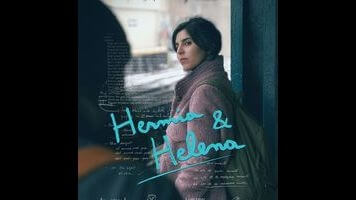There are filmmakers who draw the same motifs and plot points through every movie, like an artist who works with one brush and one set of watercolors, so that with every new picture, the colors become more intermixed. The prolific South Korean writer-director Hong Sang-soo (Right Now, Wrong Then, The Day He Arrives) is the most notorious example of this today, as half or more of his movies are about the romantic travails of backpack-wearing alter egos (often arthouse filmmakers) who are only in town briefly and could really use a drink and some company. A less extreme case is Matías Piñeiro, the Argentine writer-director of The Princess Of France, Viola, and Rosalinda, small films that revolve around Shakespeare plays being adapted or rehearsed by troupes of young artists. Although it’s largely set in New York City instead of Piñeiro’s usual Buenos Aires and leans less on the Bard than these three previous features, Hermia & Helena is no major narrative departure; it even follows the same titling scheme. (Here, the title refers to two characters from A Midsummer Night’s Dream, though, ironically, the film itself takes place mostly in the snowy dregs of midwinter.) But it’s one of those wonderful contradictions of art that directors who repeat themselves in one respect tend to be very experimental in others.
The central character of Hermia & Helena is Camila (Agustina Muñoz, a Piñeiro regular), who has come to New York to work on a new Spanish translation of A Midsummer Night’s Dream as part of one of those artist-in-residence fellowships, which comes with a small apartment that looks out on Columbus Park in Lower Manhattan. Soon after arriving, she begins to receive mysterious post cards, addressed to the previous fellow, Carmen (María Villar, another returning member of Piñeiro’s stock company), by Danièle (Mati Diop of 35 Shots Of Rum), a former participant in the same program who seems to be on a cross-country road trip toward New York. But this somewhat intriguing setup is just one story—actually the weakest of them—as Piñeiro occasionally presses restart, taking the viewer back to Camila’s departure from Buenos Aires to reveal increasingly more personal reasons for her trip to New York, while at the same time continuing the narrative chronologically. (This makes for a nice low-key gag, as the title card that announces a skip back to Buenos Aires changes to reflect the passage of time: “one month earlier,” “two months earlier,” etc.) The finest of these—which features a daylong trip upstate and a surprising turn from the micro-budgeted indie stalwart Dan Sallitt (The Unspeakable Act)—is best left unspoiled.
In between, Camila sporadically works on her translation; Skypes with her boyfriend back home (Julián Larquier Tellarini); briefly reunites with an American ex (Dustin Guy Defa, the indie director who seems to cameo in every super-low-budget indie movie worth seeing); and flirts with Lukas (Keith Poulson), her supervisor in the fellowship program. As in The Princess Of France—in which Tellarini played a young theater director returning to Buenos Aires after several years to reunite with friends and exes and record a radio play adaptation of Love’s Labour’s Lost—Piñeiro appears sweetly fascinated with what could be or could have been. This focus on possibility is his signature, a precarious balancing act between classic references (music by Beethoven and Scott Joplin; an opening dedication to the Japanese actress Setsuko Hara, best known for her work with Yasujirô Ozu) and the believable mundanities of modern-day bohemian life. (An impressive chunk of this film is devoted to scenes of characters trying to find addresses or calling to be buzzed in.) He has a very original camera style, using long takes and longer lenses to slowly pan and tilt the camera from a set position, changing focus on cue in an effect akin to editing the scene in-camera.
But he isn’t one for suffocating rigor, and part of the charm of Hermia & Helena is in the way it freely and randomly plays with form, employing luxuriantly slow dissolves, unexpected snatches of superimposed text, and even a black-and-white film-within-the-film. At times, this makes up for the occasionally awkward performances; Piñeiro is too sincere to write characters who speak exclusively in zingers, and yet his dialogue is delivered as breathlessly and flatly as the badinage of an early Whit Stillman movie.









































